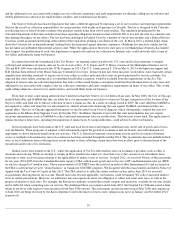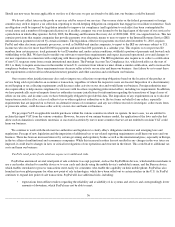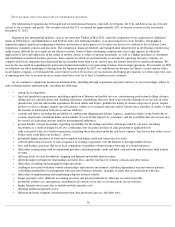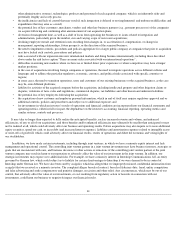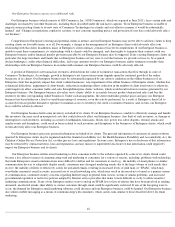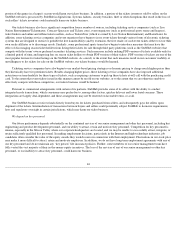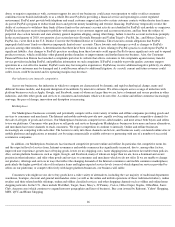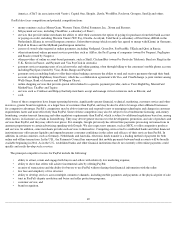eBay 2013 Annual Report Download - page 44
Download and view the complete annual report
Please find page 44 of the 2013 eBay annual report below. You can navigate through the pages in the report by either clicking on the pages listed below, or by using the keyword search tool below to find specific information within the annual report.
Our Enterprise business exposes us to additional risks.
Our Enterprise business (which consists of GSI Commerce, Inc. (GSI Commerce), which we acquired in June 2011), faces certain risks and
challenges not shared by our other businesses, including those described under the risk factor captions “If our Enterprise business is unable to
migrate certain existing clients to its new suite of Commerce Technologies in a timely and cost-effective manner, it would be substantially
harmed” and “Changes in regulations, regulatory scrutiny, or user concerns regarding privacy and protection of user data could adversely affect
our business.”
Competition for Enterprise's existing and potential clients is intense, and our Enterprise business may not be able to add new clients or keep
existing clients on favorable terms, or at all. For example, a change in the management of an Enterprise client could adversely affect our
relationship with that client. In addition, many of Enterprise's client contracts contain service level commitments. If our Enterprise business is
unable to meet these commitments, its relationships with its clients could be damaged, and client rights to terminate their contracts with our
Enterprise business and/or financial penalty provisions payable by our Enterprise business may be triggered. If any existing Enterprise clients (in
particular, the large merchants and brands that our Enterprise business serves) were to exit the business we provide services to, be acquired,
declare bankruptcy, suffer other financial difficulties, fail to pay amounts owed to our Enterprise business and/or terminate or modify their
relationships with our Enterprise business in an unfavorable manner, our Enterprise business could be adversely affected.
A portion of Enterprise's net transaction revenue is derived from the value of ecommerce transactions that flow through its suite of
Commerce Technologies. Accordingly, growth in Enterprise's net transaction revenue depends upon the continued growth of the online
businesses of its clients. Our Enterprise business may be substantially impacted by any adverse conditions in the offline businesses of an
Enterprise client that negatively impact that client's online businesses. Any impairment of the offline business of Enterprise clients, whether due
to financial difficulties, impairment of client brands, reduction in marketing efforts, reduction in the number of client retail stores or otherwise,
could negatively affect consumer traffic and sales through Enterprise clients' websites, which would result in lower revenues generated by our
Enterprise business. Our Enterprise business also relies on its clients' ability to accurately forecast product demand and select and buy the
inventory for their corresponding online businesses. Under such arrangements, the client establishes product prices and pays our Enterprise
business fees based either on a fixed or variable percentage of revenues, or on the activity performed. As a result, if Enterprise clients fail to
accurately forecast product demand or optimize or maintain access to inventory, the client's ecommerce business (and, in turn, our Enterprise
fees) could be adversely affected.
Our Enterprise business holds some inventory on behalf of its clients. If our Enterprise business is unable to effectively manage and handle
this inventory, this may result in unexpected costs that could adversely affect our Enterprise business. Any theft of such inventory, or damage or
interruption to such inventory, including as a result of earthquakes, hurricanes, floods, fire, power loss, labor disputes, terrorist attacks and
similar events and disruptions, could result in losses related to such inventory and disruptions to the businesses of Enterprise clients, which could
in turn adversely affect our Enterprise business.
Our Enterprise business processes personal information on behalf of its clients. The personal information of customers of certain websites
operated by Enterprise clients may be regulated under the Gramm-Leach-
Bliley Act, the Health Insurance Portability and Accountability Act, the
Children's Online Privacy Protection Act, or other privacy laws and regulations. In some cases, Enterprise's use or disclosure of that information
may be restricted by contractual terms, laws and regulations, and any misuse or unpermitted disclosure of that information could negatively
impact our Enterprise business and its clients.
Our Enterprise business utilizes email marketing to drive consumer traffic to the websites operated by some of its clients. Email could
become a less effective means of communicating with and marketing to consumers for a variety of reasons, including: problems with technology
that make Enterprise's email communications more difficult to deliver and for consumers to read (e.g., the inability of smart phones or similar
communication devices to adequately display email); consumers may disregard marketing emails due to the large volume of such emails they
receive; the inability of filters to effectively screen for unwanted emails, resulting in increased levels of junk mail, or “SPAM,” which may
overwhelm consumer's email accounts; increased use of social networking sites, which may result in decreased use of email as a primary means
of communication; continued security concerns regarding Internet usage in general from viruses, worms or similar problems; and increased
governmental regulation or restrictive policies adopted by Internet service providers that make it more difficult or costly to utilize email for
marketing communications. If any of our Enterprise entities were to end up on SPAM lists or lists of entities that have been involved in sending
unwanted, unsolicited emails, their ability to contact customers through email could be significantly restricted. If any of the foregoing were to
occur, the demand for Enterprise email marketing solutions could decrease and our Enterprise business could be harmed. Our Enterprise business
also utilizes mobile messaging as a means of communicating with consumers, which carries risks similar to those described above for email
marketing.
42





